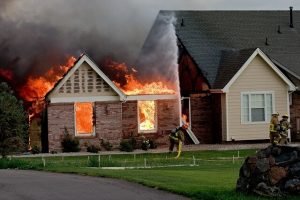Experienced Legal Defense for Arson Charges in New Mexico

Essentially any structure or personal property ignited illegally on fire is an act of arson. The state laws are complex regarding arson, but there are key items to know if you are arrested or convicted for arson-related crimes.
State Fire Investigators Determine Arson
Arson, or any question of arson acts, are investigated by the State Fire Investigators. Typically, fire investigators are called to look into a scene when there is no city investigator, a large financial loss is accounted, or there is evidence of an incendiary fire. If there is a fatality or vehicle fire associated with the act, State Fire Investigators are called in to assess.
Arson and Aggravated Arson Are Different Offenses
You might be charged with arson or aggravated arson, depending on the circumstances.
- Arson – Arson is the malicious or willful starting of a fire or creating an explosion with the purpose of destroying property. Per Statute Section 30-17-5, the property includes buildings, occupied structures, assets of another, bridges, fencing, signage, or any property where a person could collect insurance for the loss. Depending on the value of the loss, you could face a misdemeanor or felony charge.
- Aggravated Arson – Aggravated arson falls under Statute Section 30-17-6, which states that the act must be willful or malicious with the direct intent to damage with explosion or fire. These aggravated events occur against bridges, aircraft, public or private buildings, vehicles, pipelines, utilities, and railways. Aggravated arson is a second-degree felony.
Understanding the Punishments of Arson
Arson is a property crime but still, carries serious penalties.
If convicted of regular arson, you could face several punishments, including:
- Petty Misdemeanor – If the arson damage results in $250 in damage or less.
- Misdemeanor – If the arson damage results in more than $250, but no more than $500, then you have committed a misdemeanor.
- Fourth Degree Felony – Arson that involves over $500 in damage but less than $2,500 is a fourth-degree felony.
- Third Degree Felony – When the arson damage exceeds $2,500 but is less than $20,000, you face the punishment of a third-degree felony.
- Second Degree Felony – When the damage exceeds $20,000, you face second-degree felony charges.
All crimes determined as aggravated arson result in a second-degree felony regardless of property value. These punishments carry a few days to a few years in prison, along with thousands in fines.
Civil Penalties and Restitution
In addition to the criminal penalties, the courts are likely to require that you pay restitution to the victim. This compensation is not limited to the property value either. You could be required to pay the pain and suffering, personal property loss, and any bodily harm damages you cause. If convicted in criminal court, it is more likely you will be held responsible in a civil lawsuit, too.
Protect Your Rights – Speak with a Criminal Defense Attorney
Arson crimes are severe. Not only do you face the potential of a felony conviction, but any criminal conviction can affect you the rest of your life.
To protect your freedom and best interests, speak with a criminal defense attorney from New Mexico Criminal Law Offices today at 505-375-4763. We offer free, no-obligation case evaluations. Schedule yours now or contact us online with your questions.

